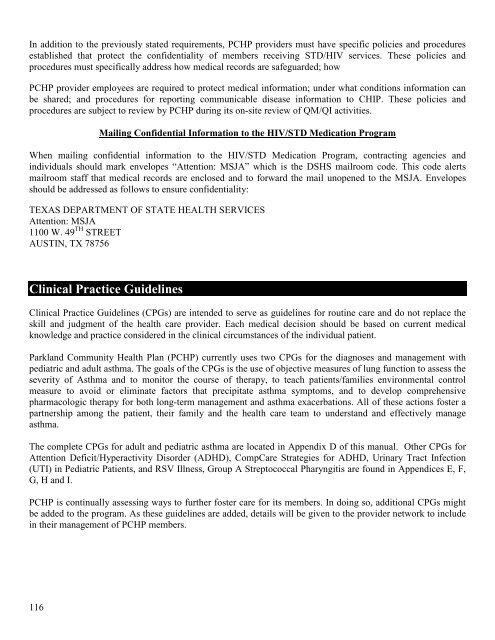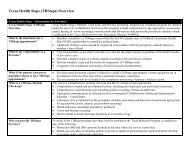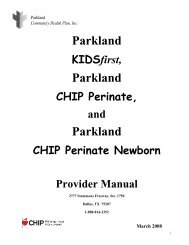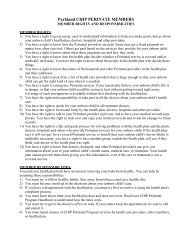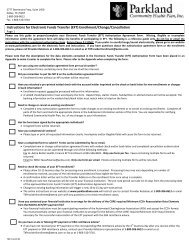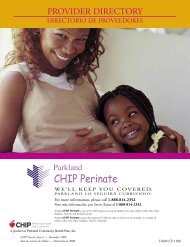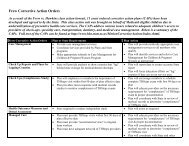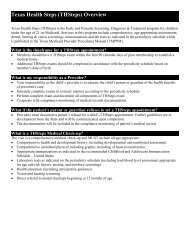PARKLAND HEALTHfirst - Parkland Community Health Plan, Inc.
PARKLAND HEALTHfirst - Parkland Community Health Plan, Inc.
PARKLAND HEALTHfirst - Parkland Community Health Plan, Inc.
You also want an ePaper? Increase the reach of your titles
YUMPU automatically turns print PDFs into web optimized ePapers that Google loves.
In addition to the previously stated requirements, PCHP providers must have specific policies and procedures<br />
established that protect the confidentiality of members receiving STD/HIV services. These policies and<br />
procedures must specifically address how medical records are safeguarded; how<br />
PCHP provider employees are required to protect medical information; under what conditions information can<br />
be shared; and procedures for reporting communicable disease information to CHIP. These policies and<br />
procedures are subject to review by PCHP during its on-site review of QM/QI activities.<br />
Mailing Confidential Information to the HIV/STD Medication Program<br />
When mailing confidential information to the HIV/STD Medication Program, contracting agencies and<br />
individuals should mark envelopes “Attention: MSJA” which is the DSHS mailroom code. This code alerts<br />
mailroom staff that medical records are enclosed and to forward the mail unopened to the MSJA. Envelopes<br />
should be addressed as follows to ensure confidentiality:<br />
TEXAS DEPARTMENT OF STATE HEALTH SERVICES<br />
Attention: MSJA<br />
1100 W. 49 TH STREET<br />
AUSTIN, TX 78756<br />
Clinical Practice Guidelines<br />
Clinical Practice Guidelines (CPGs) are intended to serve as guidelines for routine care and do not replace the<br />
skill and judgment of the health care provider. Each medical decision should be based on current medical<br />
knowledge and practice considered in the clinical circumstances of the individual patient.<br />
<strong>Parkland</strong> <strong>Community</strong> <strong>Health</strong> <strong>Plan</strong> (PCHP) currently uses two CPGs for the diagnoses and management with<br />
pediatric and adult asthma. The goals of the CPGs is the use of objective measures of lung function to assess the<br />
severity of Asthma and to monitor the course of therapy, to teach patients/families environmental control<br />
measure to avoid or eliminate factors that precipitate asthma symptoms, and to develop comprehensive<br />
pharmacologic therapy for both long-term management and asthma exacerbations. All of these actions foster a<br />
partnership among the patient, their family and the health care team to understand and effectively manage<br />
asthma.<br />
The complete CPGs for adult and pediatric asthma are located in Appendix D of this manual. Other CPGs for<br />
Attention Deficit/Hyperactivity Disorder (ADHD), CompCare Strategies for ADHD, Urinary Tract Infection<br />
(UTI) in Pediatric Patients, and RSV Illness, Group A Streptococcal Pharyngitis are found in Appendices E, F,<br />
G, H and I.<br />
PCHP is continually assessing ways to further foster care for its members. In doing so, additional CPGs might<br />
be added to the program. As these guidelines are added, details will be given to the provider network to include<br />
in their management of PCHP members.<br />
116


